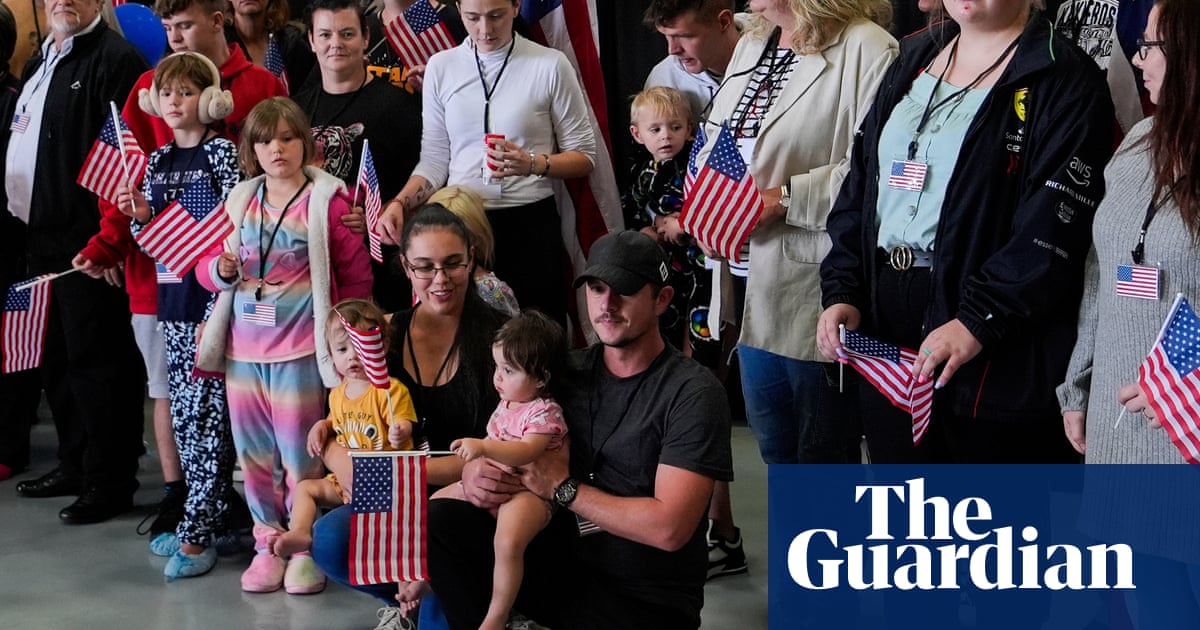The first group of white South Africans granted refugee status by Donald Trump’s administration has arrived in the US, stirring controversy inSouth Africaas the US president declared the Afrikaners victims of a “genocide”.
The Afrikaners, a minority descended from mainly Dutch colonists, were met at Dulles international airport outsideWashington DCby US deputy secretary of state, Christopher Landau, and deputy secretary of homeland security, Troy Edgar, with many given US flags to wave.
Reuters reported that the group numbered 59 adults and children, citing a state department official, while Associated Press said there were 49.
At Dulles airport, Landau told the assembled white South Africans: “It is such an honour for us to receive you here today … it makes me so happy to see you with our flag in your hands.
He invoked his family’s history, saying: “My own father was born in Europe and had to leave his country when Hitler came in … We respect what you have had to deal with these last few years.”
He added: “We’re sending a clear message that the United States really rejects the egregious persecution of people on the basis of race in South Africa.”
On the same day the group arrived in the US, Trump’s government also ended legal protections that had temporarily protected Afghans from deportation, citing an improved security situation in the country, which is ruled by the Taliban.
One consideration for resettling Afrikaners not Afghans was that “they could be easily assimilated into our country,” Landau told reporters at the airport.
Trumpsuspended the US refugee settlementprogramme in January, leavingmore than 100,000 peopleapproved for refugee resettlement stranded. Then, in February, hesigned an executive orderdirecting officials to grant refugee status to Afrikaners, whose leaders ruled during apartheid while violently repressing the Black majority.
“It’s a genocide that’s taking place,” Trump told reporters at the White House, when asked why white South Africans were being prioritised for resettlement above victims of famine and war elsewhere on the continent, echoing a far-right conspiracy theory that has also been amplified by hisSouth African-born billionaire adviser Elon Musk.
Trump added that the Afrikaners’ race “makes no difference to me”. He said South Africa’s leaders were travelling to meet him next week, but that he would not attend the G20 leaders’ meeting in Johannesburg in November unless the “situation is taken care of”.
Sign up toThis Week in Trumpland
A deep dive into the policies, controversies and oddities surrounding the Trump administration
after newsletter promotion
South Africa’s president, Cyril Ramaphosa, said at a conference in Ivory Coast that he had told Trump by phone that he had received false information about white South Africans being discriminated against, from people who disagreed with government efforts to redress the racial inequalities that still persist three decades after white minority rule ended.
“We think that the American government has got the wrong end of the stick here, but we’ll continue talking to them,” he said.
White South Africans typically have 20 times the wealth of Black people, according to anarticlein the Review of Political Economy. The Black South Africanunemployment rate is 46.1%, compared with 9.2% for white people.
Laura Thompson Osuri, executive director ofHomes Not Borders, a refugee care nonprofit in the Washington area, stood in the airport check-in area with a sign reading: “Refugee. Noun. A person who has been forced to leave his or her country due to persecution, war or violence. Afrikaners are not refugees.”Osuri said of Trump’s policy: “It’s for showing: ‘Look at us. We do welcome people as long as they look like us.’”
Democrats also condemned the Afrikaners’ resettlement. Maryland senator Chris Van Hollentold a thinktank event: “To watch the Trump administration apply what I call their global apartheid policy … is just an outrageous insult to the whole idea of our country.”
Meanwhile, the Episcopal church said it was ending its decades-long work with the US government supporting refugees, after it was asked to help resettle the white South Africans, citing its “commitment to racial justice and reconciliation”.
